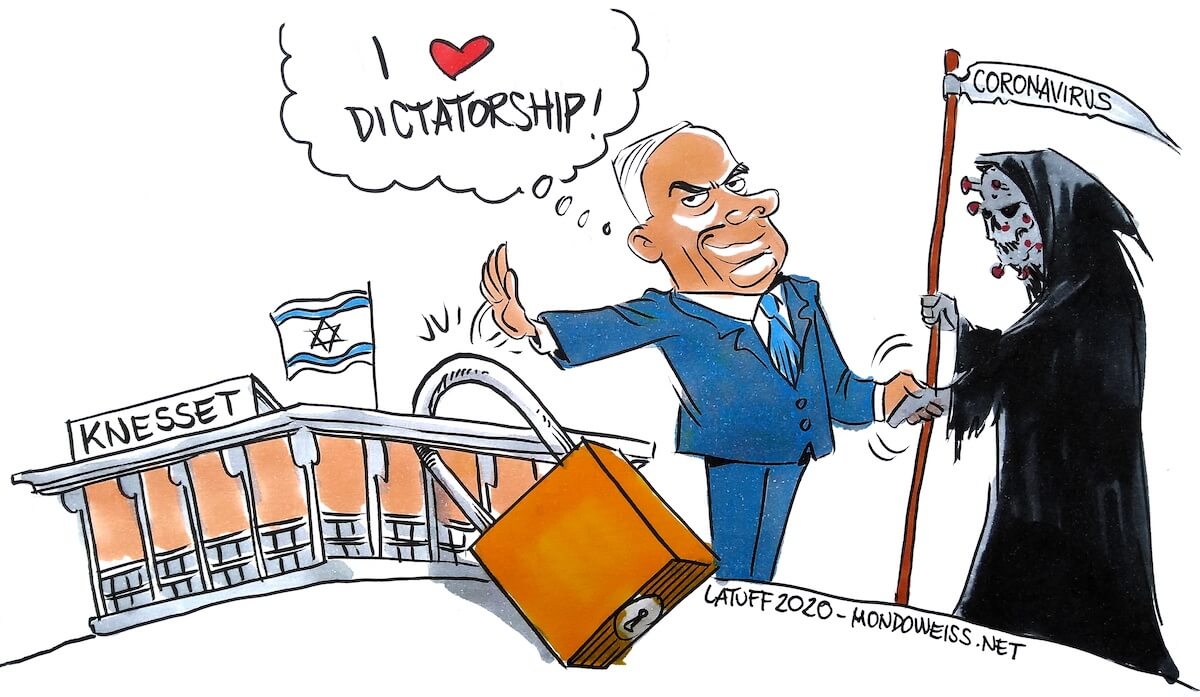The suspension of Israeli ‘democracy’

(Cartoon: Carlos Latuff)
Israel is currently experiencing what many perceive to be a crackdown on core democratic institutions, under the pretext of a response to the coronavirus pandemic.
I write ‘perceive’ because I have a different view, but back to that later. First a few data points:
After Netanyahu’s centrist rival, Benny Gantz of the Blue and White Party, received a slight majority mandate backing of 61 he got a first shot at creating a government from the Israeli president. The backing of Gantz by the full 15-seat Joint List of largely-Palestinian legislators is not to be read as a measure of his actual intent to include them in government. Blue White have been pursuing the possibility of a wide national-unity government that would include Likud, though that seemed to fail so far, and they are keeping their cards close re the Joint List so they can have it both ways:
1) not to offend Palestinians by saying they don’t really mean it
2) to hold their majority cards so as to apply maximum leverage against Likud to somehow obtain such a unity government.
But the beans get spilled, like when Blue White leader Gabi Ashkenazi’s wife said to a right-wing protester outside her home that “Blue White don’t go with Arabs”.
The Blue and White plan was first to pass legislation limiting Netanyahu’s ability to become Prime Minister again (for the 5th term), by imposing term limits and restrictions against an indicted lawmaker serving as prime minister (Avigdor Liberman’s agenda). But the plan was foiled when Knesset speaker, Netanyahu loyalist Yuli Edelstein, managed on Wednesday to close the Knesset parliament, citing the threat of coronavirus (although such a step is perhaps just as novel as the virus itself, and not seen in countries hit far worse than Israel).
Edelstein’s lockdown meant that he as speaker could not be replaced by Blue White. So the move stopped the regular process of setting up committees and votes that could lead to the barring of Netanyahu.
Even before that, in the late night hours, Justice Minister Amir Ohana, also a Netanyahu loyalist, effectively closed the courts except for certain urgent cases – because of coronavirus, of course. Netanyahu’s corruption cases, which were set to have a first hearing this week, are not considered urgent, so the case is postponed by over two months for now.
In addition, Netanyahu has set in motion directives to enact surveillance on private citizens through their cellphones. “There is no choice”, he said.Coronavirus, of course.
Now, under normal circumstances, these steps would be seen as an obvious suspension of democratic principles, if one believed that the democracy was real. What is interesting here is that those enacting these authoritarian and invasive measures are not arguing that they are liberal– no, they are arguing that they are merely temporary – coronavirus, we all know.
This vein of suspending ‘normal’ protocol is what is generally known as a ‘state of emergency’. But ‘state of emergency’ is a principle that Israel has been applying ever since its inception, in varying degrees yet constantly, almost exclusively against Palestinians.
In 1948-1966, Israel ‘suspended’ what would otherwise be a state of democratic equality, putting Palestinian citizens under martial law.
A year after that status was relaxed (in November 1966), Israel came to control many more Palestinians under its 1967 occupation. The occupation, too, was presented as a temporary situation, which could justify temporary undemocratic measures. The occupation is now of course almost 53 years old. Israel has also been applying emergency regulations of 1945, from the British Mandate period, to enact ‘temporary’ measures of detention without trial (for renewable periods of 6 months) as well as punitive home demolitions and other draconian measures – all targeting Palestinians almost exclusively. Cellphone surveillance is very familiar to Palestinians.
Even those Palestinians who are living highest in Israel’s multi-tiered Apartheid system (2nd-class citizens, occupied, besieged, expelled), are living under a myriad of discriminatory laws. One of those laws, barring family reunifications between citizens and subjects in occupied territory, was passed as ‘temporary’ legislation in 2003, ostensibly to prevent terror. But in 2005 then Prime Minister Ariel Sharon admitted the real intent of the law, saying it was about preserving a Jewish state, and that there really is no need to “hide behind security arguments”. That law had to be renewed each year, which it was. Temporary, of course!
So today many Israelis are shocked by the suspension of democratic trappings and rights, concerned that it’s not really about a temporary tackling of an emergency, but rather a cynical ploy of Netanyahu and Likud to maintain power. They are probably right. A “putsch,” says Israel’s former chief archivist.
But in the bigger picture, this process is only emulating what has been the Palestinian experience under the “Jewish democracy” – which is a fake democracy for Jewish privilege.
Because this is the Zionist character, and it’s no wonder that the masks of “democracy” fall at certain critical pressure points, even when it’s Jews vs Jews.
Because first they came for the Palestinians – they always come first for the Palestinians. But Zionists were not Palestinians, so most did not speak up.




Geen opmerkingen:
Een reactie posten